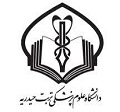(2018) اثربخشی آموزش مدیریت استرس بر کیفیت زندگی و فرسودگی شغلی آتش نشانان شهر تهران. Journal of Torbat Heydariyeh University of Medical Sciences. pp. 11-19. ISSN 2538-2845
|
Text
thums-jms-v6n1p11-fa.pdf Download (278kB) | Preview |
Persian Abstract
زمینه و هدف: آتش نشانان به دلیل فعالیت در محیط های پرخطر در معرض استرس های گوناگون قرار دارند که این استرس ها می تواند باعث بروز فرسودگی شغلی و اثرات منفی بر کیفیت زندگی آتش نشانان شود. لذا هدف این پژوهش، بررسی اثربخشی مدیریت استرس بر کیفیت زندگی و فرسودگی شغلی آتش نشانان تهران بود. روشها: پژوهش حاضر نیمه تجربی با پیش آزمون و پس آزمون و گروه کنترل می باشد. جامعه آماری تمامی آتش نشان های مرد در سازمان آتش نشانی شهر تهران در سال 1395 بودند که با استفاده از نمونه گیری تصادفی ساده تعداد 30 نفر از آنها انتخاب و در دو گروه آزمایش و کنترل جای گرفتند. گروه آزمایش طی 10 جلسه 90 دقیقه ای تحت مداخله آموزش مدیریت استرس قرار گرفت. در حالی که در این مدت گروه کنترل هیچ مداخله ای را دریافت نکردند. برای جمع آوری داده ها از دو مقیاس کیفیت زندگی سازمان بهداشت جهانی و فرسودگی شغلی ماسلاچ و جکسون استفاده شد. داده ها با استفاده از تحلیل کواریانس و با نرم افزار SPSS نسخه 21 تحلیل شدند. نتایج:نتایج نشان داد که بین دو گروه در پیش آزمون تفاوت معنی دار وجود نداشت، اما آموزش مدیریت استرس در گروه آزمایش، نمرات مؤلفه های کیفیت زندگی به طور معنی داری افزایش و نمرات فرسودگی شغلی به طور معنی داری (0/05>P) کاهش داد. نتیجه گیری: این مطالعه نشان داد که برنامه آموزشی مدیریت استرس می تواند موجب افزایش کیفیت زندگی و کاهش فرسودگی شغلی آتش نشانان شود. لذا به مدیران مراکز آتش نشانی توصیه می شود که از این برنامه برای ارتقای سلامت روان آتش نشانان استفاده کنند.
Title
Effectiveness of Stress Management Training on Life Quality and Occupational Burnout among Firefighters of Tehran
Abstract
Background & Aim: Due to hazardous working conditions, firefighters are exposed to different types of stress which might cause occupational burnout and impact their quality of life. Therefore, the present study was conducted to determine the effectiveness of stress management training on the life quality and occupational burnout among firefighters in Tehran. Methods: Current study is a quasi-experimental study including pre- and post- tests and control group. The statistical population of the study was male firefighters of Tehran Fire Department in 2016.&nbsp; Thirty participants were selected through random sampling and were randomly assigned into the experimental (N=15) and control (N=15) groups. The experimental group underwent ten training sessions of stress management (90 minutes each). The control group did not receive the intervention. Two life quality scales, namely The World Health Organization Quality of Life-BREF ((WHOQOL-BREF) and Maslach Burnout Inventory (MBI-22) were used to gather the data. The data were analyzed based on covariance analysis using SPSS software version 21. Results: The results showed that there was no significant difference between the two groups at pretest, while stress management training of the experimental group significantly increased life quality components (P<0.05) and caused meaningful decrease of occupational burnout scores (P<0.05). Conclusion: The present study showed that stress management training program can increase the life quality and decrease occupational burnout of firefighters. Therefore, managers of Fire Departments are recommended to use this program to improve the mental health of firefighters.
| Item Type: | Article |
|---|---|
| Keywords: | Stress, Life Quality, Occupational Burnout, Firefighter |
| Page Range: | pp. 11-19 |
| Journal or Publication Title: | Journal of Torbat Heydariyeh University of Medical Sciences |
| Journal Index: | Not Index |
| Volume: | 6 |
| Number: | 1 |
| Publisher: | Torbat Heydariyeh University of Medical Sciences |
| ISSN: | 2538-2845 |
| Depositing User: | دکتر محبوبه عبداللهی |
| URI: | http://eprints.thums.ac.ir/id/eprint/696 |
Actions (login required)
 |
View Item |



